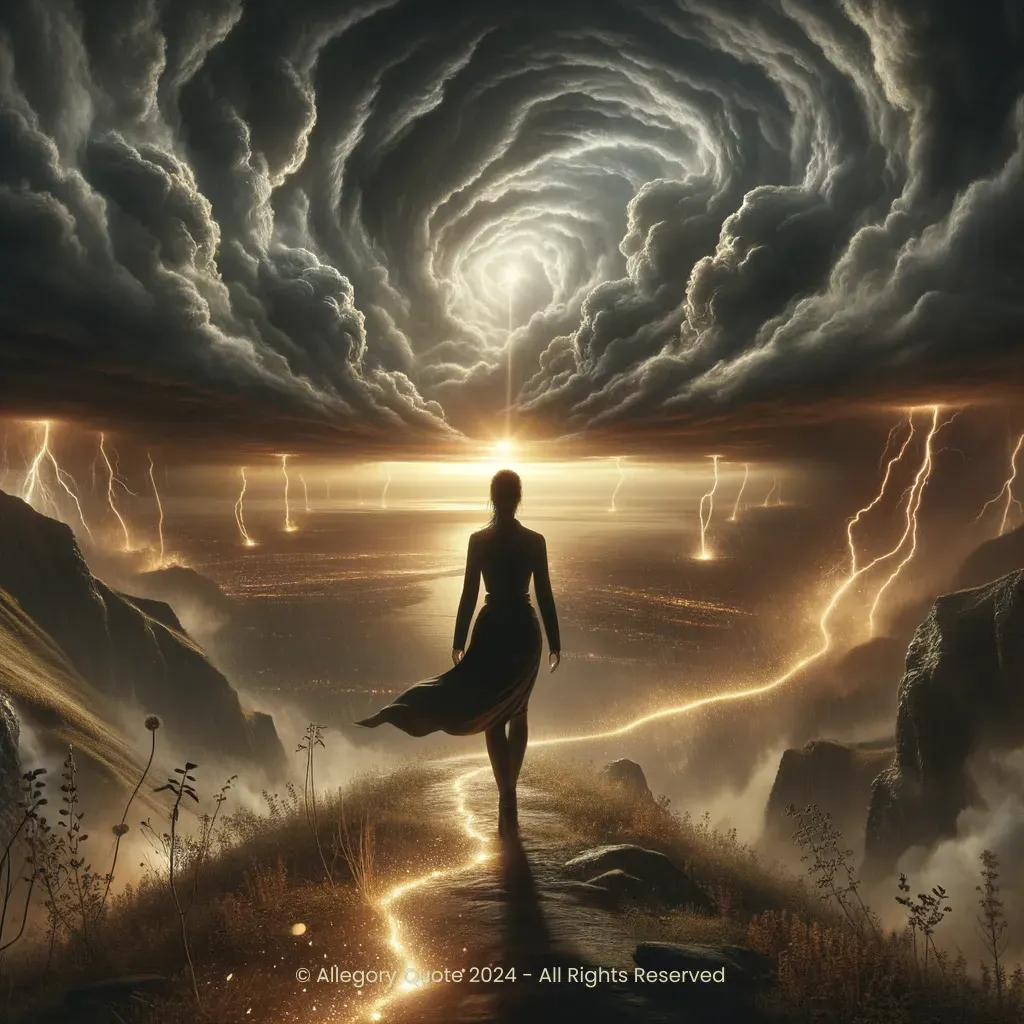”You never know how strong you are,
until being strong is your only choice“

0
0
0
0
- Meaning
- This phrase means that people often discover their true strength and resilience only in times of difficulty and necessity. When there are no other options, individuals are forced to dig deep and uncover the inner strength they may not have known they possessed. It's a testament to human perseverance and the ability to overcome adversity when facing life's toughest challenges.
- Allegory
- In this allegorical image, the solitary figure represents an individual facing life's challenges head-on. The dark, stormy sky captures the intensity and difficulty of the circumstances, while the lightning highlights both the danger and the power inherent in the moment. The figure's resolute stance symbolizes inner strength and an unyielding spirit. The path of light leading to a sunlit horizon signifies hope and the belief that perseverance will lead to better times. Lastly, the rugged landscape emphasizes the arduous journey but underscores the figure’s capability to endure and overcome, aligning perfectly with the motivational core of the phrase.
- Applicability
- This phrase can serve as a powerful reminder and source of comfort during challenging times. When faced with difficult circumstances, remembering that you have the strength within you to persevere can be incredibly empowering. It encourages self-reliance and fortitude in personal crises, struggles, and setbacks, whether it be health issues, financial woes, relationship troubles, or any other life challenges.
- Impact
- The phrase has had a significant cultural impact, especially in self-help and motivational spheres. It is often quoted in contexts such as overcoming addiction, dealing with terminal illnesses, or facing any personal adversity. It's a common choice for motivational posters, speeches, books, and social media posts, emphasizing the human capacity for resilience.
- Historical Context
- The exact historical context of when this phrase first appeared is unclear. It has been popularly associated with Bob Marley, who rose to fame in the 1970s. Marley was known for advocating resilience and positivity through his music, which might have contributed to the phrase's widespread attribution to him.
- Criticisms
- Criticisms and controversies related to this phrase are minimal, though some might argue that it oversimplifies complex emotional and psychological circumstances. People facing severe hardship may find it challenging to relate to or find solace in such statements, feeling that it downplays the difficulty of their experiences.
- Variations
- The phrase can appear in slightly different forms, but the core message remains the same. In other cultures, similar sentiments might be expressed through various proverbs and sayings that underscore the theme of resilience and discovering inner strength. For example, in Japanese culture, there is a saying, "Fall seven times, stand up eight," which conveys a similar message of perseverance.
-

Love is not love which alters when it alteration finds, or bends with the remover to remove.
-

Love is blind, and lovers cannot see the pretty follies that themselves commit.
-

What doesn't kill you makes you stronger.
-

In the midst of chaos, there is also opportunity.
-

The only limit to our realization of tomorrow will be our doubts of today.
-

Every tongue should confess that Jesus Christ is Lord, to the glory of God the Father.
-

Der frühe Vogel fängt den Wurm.
-

And just as someone who, with laboring breath, has escaped the sea to reach the shore, turns back to gaze at the perilous waters.
-

Well-behaved women seldom make history.
-

Our long national nightmare is over.
No Comments